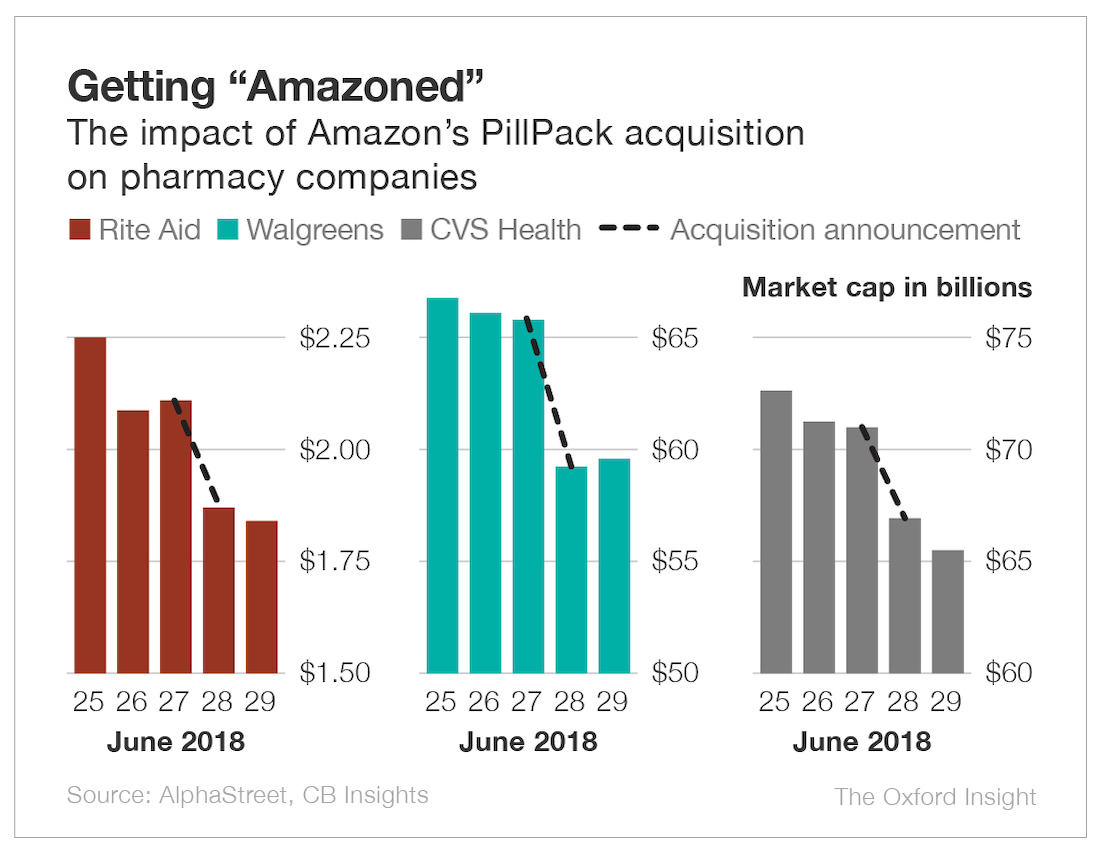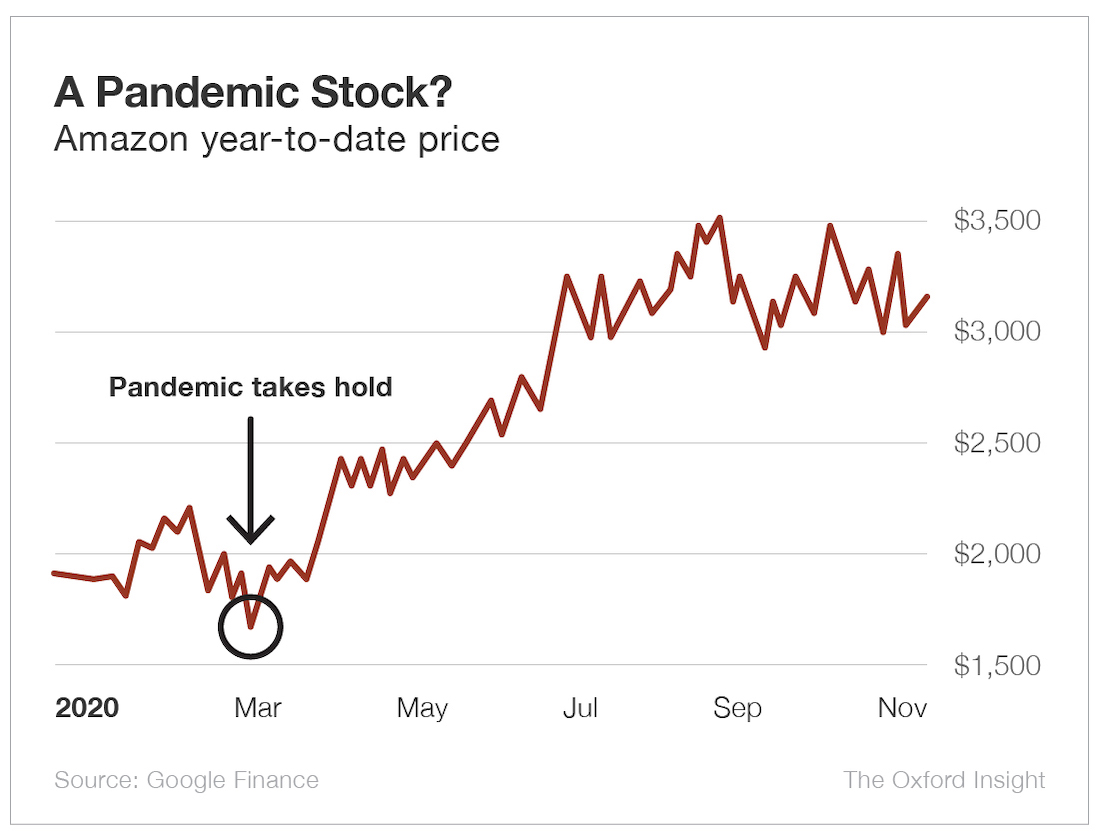This Disruptive Force Is Changing the Market One Industry at a Time
From Baltimore – Company after company and industry after industry have fallen victim to it. It has disrupted markets and sent share prices plummeting.
Its wake has often been one of devastation and ruin.
The coronavirus?
Nope. I’m talking about Amazon (Nasdaq: AMZN).
The e-retailer behemoth has a history of taking over entire industries (remember book shops, big-box toy stores and e-readers?) and utterly transforming them. Analysts call it “getting Amazoned.” Company executives live in fear of it, and we investors can’t ignore it.
And the online retail giant did it again this week.
Yesterday, Amazon announced Amazon Pharmacy, a digital pharmacy that will sell and deliver prescription drugs, which will be discounted for Amazon Prime members.
The impact on shares of other pharmaceutical companies was swift and sure.
On Tuesday, CVS Health (NYSE: CVS) fell 8.6%, Walgreens Boots Alliance (Nasdaq: WBA) dropped 9.6% and Rite Aid (NYSE: RAD) plummeted more than 16%. All in a single trading session.
Oh, and let’s not forget GoodRx (Nasdaq: GDRX), which runs an online drug price comparison platform that helps consumers find the best prices for their prescriptions. That stock dropped more than 20%.
If that’s not devastation, I don’t know what is.
This is not Amazon’s first foray into drug retailing. Two years ago, it acquired PillPack, which fills prescriptions for customers in presorted single-dose packs. And it was only a warning shot to the industry, as PillPack’s reach has been constrained by its distribution licenses.
Still, that limited move into the industry in 2018 caused Walgreens, CVS and Rite Aid to lose about $11 billion in value… overnight, according to technology research group CB Insights. Take a look and see for yourself…

Alexa, Cough, Cough
Consumers love the ease and service Amazon provides, not to mention the prices. That makes prescription retailing a potentially very good fit for Amazon.
Do you hate waiting in line at the local pharmacy? Have you struggled with confusing health insurance to get your meds paid for? Amazon has a knack for making such unpleasant experiences easier and less painful.
And it seems to have bigger plans yet. Amazon now holds a patent for a technology that allows Alexa, the Amazon cloud-based voice service, to detect a cough or cold through the change in your voice and then recommend a medication.
But many businesses and economists – and more than a few politicians – say the company is becoming a retail monopoly that needs to be reined in.
It’s not clear when or whether that will happen. In the meantime, after testing the drug retail waters with PillPack, Amazon has now dived in headfirst with Amazon Pharmacy.
The question is, what does this mean for investors?
For insights on that, I went to my go-to retail analyst, Chief Trends Strategist Matthew Carr.
Is Amazon a Misunderstood Stock?
“I think Amazon is one of those stocks every investor should own,” Matthew says. “Its move into the online pharmacy space has been in the works for some time through Project 1492.” (That’s a secret health tech team Amazon put in place several years ago that works on medical records and virtual doctor appointments.)
Amazon is often misunderstood, Matthew adds. He says it’s really more of a supply management company than it is a retailer or cloud services provider. “Amazon is arguably the greatest supply chain management company on the planet. This is what it brings to the table and why Rite Aid, CVS and others are in trouble. Amazon has the ability to majorly bring down costs – and that’s needed now more than ever.”
Yet Amazon shares are not cheap. And I mean that in two ways.
First, the price of a share is about $3,130, so it’s not easy to invest in. Fortunately, several brokers now offer fractional shares, so you can invest in expensive stocks like Amazon without paying for a whole share at a time. Fidelity, SoFi Invest and Robinhood are among the brokers that offer this service.
Perhaps more important, Amazon stock is expensive relative to its sales. Its price-to-sales multiple is 3.5 times 2021 sales estimates… one of the highest sales multiples it’s had in years. Essentially, you’re paying a lot for this stock compared with stocks of other retailers.
Also, there’s the COVID-19 vaccine “problem.” Amazon and other stay-at-home stocks have been absolutely on fire since the pandemic took hold in March. They’ve become the new defensive stocks, as the chart below illustrates.

Exactly what, some analysts are now asking, will happen when a COVID-19 vaccine frees us all to move about the country again? Amazon shares can only drop, right?
Again, we turn to Matthew Carr. “Online retail will ease back some from its percentage of total sales when a reopening gets underway,” Matthew says. But the nine months we’ve all spent shopping online have “fundamentally changed the retail landscape forever.” And Matthew thinks the long lockdown has accelerated online retail adoption by five years or more. “More people now realize how easy it is and know it works, and it’ll remain a major part of their lives.”
Alas, for CVS and Walgreens, “the last real rampart for brick-and-mortars is pharmacies,” Matthew adds.
It seems that rampart is now breached. Invest accordingly.
Good investing,
Matt
P.S. Matthew is my go-to guy for trends in retail and many other market segments. He and Energy and Infrastructure Strategist David Fessler provide expert investing guidance and recommendations in their newsletter, Strategic Trends Investor. Click here to learn more.